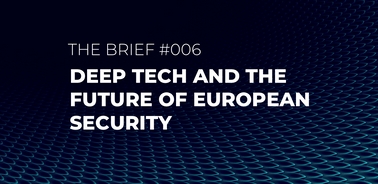- Home
- News And Events
- News
- The Brief #006 Deep Tech And The Future Of European Security
THE BRIEF #006 Deep Tech and the Future of European Security

IN BRIEF
In the EU’s pursuit of strategic autonomy, deep tech could play an important role in ensuring a strong and effective European defense policy.
THE GIST
It was recently reported that the EU has committed to investing 1.4 billion euros in 2025 to support the growth of the European deep tech sector. But what is deep tech? According to de la Tour et al., deep tech refers to innovative technology solutions that are built around unique, protected or hard-to-reproduce scientific or technological advantages. Due to their nature, they have high barriers to entry and require large upfront investments. This is the case because these technologies define the industries of the future that do not exist yet and hold a unique potential for innovation, impact, and progress, one that demands a well-balanced analysis to fully capitalize on their promise.
The EU has introduced various initiatives to promote the development of European deep tech ventures, such as DeepTechValleys, the Deep Tech Initiative or the European Innovation Council. Currently, the main areas of focus of European deep tech ventures are AI, aerospace, chemistry, clean energy, and life sciences, but they might be expanded on to other areas as well.
With the economy and security increasingly reinforcing each other, deep tech advancements could significantly contribute to the European defense strategy. The EU is becoming aware of this interconnection, as evidenced by Mario Draghi’s report, which highlights the important role dual-use technologies play in enhancing civilian-defense cooperation. Recognizing the important role deep tech can play in defense, NATO has also launched its defense-oriented programs to stimulate innovation, most notably the NATO Innovation Fund.
THE TAKEAWAY
The aforementioned initiatives underscore the growing importance institutions are giving to deep tech, and their potential application to the defense sector. When applied to the defense sector, deep tech technologies could, for example, use behavioral AI to predict both cyber and physical attacks or use the space environment to develop semiconductor materials to make critical infrastructure more resilient.
As Europe continues promoting deep tech and, potentially, making it a big part of its defense policy, it may find itself navigating diverse challenges: Should it deepen its partnerships with NATO? Should it focus on developing EU initiatives to safeguard European autonomy? Or should it pursue a hybrid approach to deep tech? Ultimately, whatever decision the EU makes, the outcome will have the potential to shape the EU’s security landscape and its role as a global security actor.
DELVE DEEPER
NATO Defense Innovation and Deep Tech: Measuring Willingness and Effectiveness (Carnegie Endowment for International Peace), by Raquel Jorge Ricart. This article analyzes the challenges and opportunities associated with integrating deep tech into NATO’s defense strategy. It assesses the willingness of member states to embrace deep tech and the effectiveness of initiatives like the Nato Innovation Fund.
What is “Deep Tech” and what are Deep Tech Ventures? (MIT), by Oihana Basilio Ruiz de Apodaca, Fiona Murray and Lars Frolund. This paper elaborates on the meaning of “deep tech” and identifies five criteria for defining deep tech ventures.
Deep Tech: The Great Wave of Innovation (BCG & Hello Tomorrow), by Arnaud de la Tour et al. This report offers an in-depth analysis of the field of deep tech and distinguishes it from previous digital technologies.